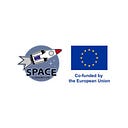Preparing to launch…
The SPACE Consortium, which is supported by Erasmus+, has its first anniversary at the end of October 2021! How time flies when you spend most of the time thinking about traveling to space. A perfect time to give a small update for our readers where we currently stand, what we are tinkering on and what is planned for the upcoming weeks and months.
An unusual year
Collaborating internationally during a global pandemic is a rough start to a project. We had to switch to a digital working environment and digital meetings with our colleagues from France, Italy, Hungary and the Netherlands. We used the first month to lay out a digital infrastructure before starting with working on our outputs (IO’s) — a student’s workbook, a teacher’s handbook and a STE(A)M-handbook. To create these, we work in three phases: creation, pilot and evaluation and adjustment. Taking the time to lay out the digital infrastructure enabled us to create a transparent online working environment in which we could easily start working on the creation phase of our assigned outputs.
Where we stand
Phase 1: the creation phase
Each of the different segments in the creation phase started with a needs assessment, to ensure the products are aligned with the needs of learners, teachers and contextual requirements (e.g. national curricula, expectations, prerequisites).
We used design thinking and co-creation methodologies in a number of transnational workshops in which we co-created the key learnings, learning objectives, content and activities per lesson. In between, there were countless meetings between teachers / educational experts working on lessons and many online review rounds of materials.
From the beginning of April 2021 until July 2021 we had a total of eight online co-creating workshops with the entire team. By closely working together, we co-created an overarching narrative for 12 lessons and also thought of a character — our mascot, so to say — that guides the children through the lessons. That character is still a good-kept secret for now. We put a lot of effort in the consistency and logical didactical build up between the lessons.
The learning trajectory consists of 4 modules, with 3 lessons each:
- Exploring space
- Our unique planet Earth
- Earth’s environment and human impact
- Taking action to protect our planet.
By the end, the children will have all the tools to become the future ambassadors of planet Earth. In the last lesson, this is made more concrete by having the children develop and execute a ‘children version’ of the EU green deal for their school.
Right now, we are in the final stages of creating the material. We are proud to say that after almost a year of online meetings, co-creating and brainstorming, all the products of the creation phase of the IO’s are being delivered very soon!
What’s to come
Phase 2: the pilot phase
In the next phase we will pilot the material with hundreds of children in different school classes with a variety of teachers. The plan is to start the pilot in 2022. The SpaceBuzz will travel from the Netherlands to the participating countries to enable the children to go to space in a rocket vehicle thanks to Virtual Reality in combination with moving chairs (so-called XR technology). The first 6 lessons will start prior to the arrival of the SpaceBuzz and the last 6 lessons will be given after.
The tinkering doesn’t stop here! During and after the pilot we will monitor the learning effects of children and self-efficacy of teachers using our materials. Practical issues will be taken into account. Based on the outcomes of the pilot, we will adjust the materials and lessons, but this is still light years away. For now we will focus on the final stages of the creation phase before launching across Europe. Stay tuned!
Written by Laurin Ivetic (Education Coordinator, SPACE Consortium)
Thanks for reading! Make sure to follow us on our YouTube channel and on LinkedIn.
The SPACE Consortium is a transnational collaboration of education professionals from France, Hungary, Italy and the Netherlands and is co-funded by the European Union.
